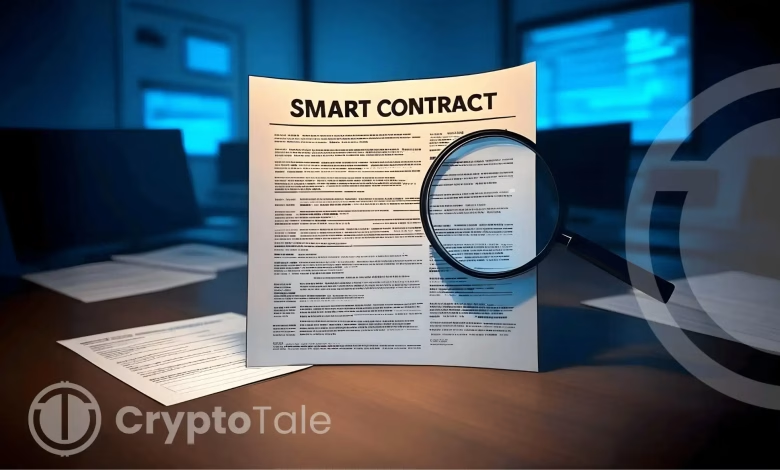What is a Smart Contract Audit? A Comprehensive Guide

In the world of DeFi, which is composed of smart contracts, the security and reliability of these contracts are paramount. Even a small vulnerability can lead to significant problems, potentially affecting the entire protocol. This is where smart contract audit comes in; they help resolve all the issues associated with smart contracts. In the article, we’ll talk about smart contract audits, why they are important, how they work, and common vulnerabilities in smart contracts.
What is a Smart Contract Audit?
A Smart Contract audit is the process of conducting a detailed analysis of the smart contract code. This is done to identify any errors, vulnerabilities, inefficient coding, or issues in the code that could potentially affect the contract’s performance and determine ways to resolve them. The audit helps guarantee the smart contract’s security, functionality, and reliability before it is released on the blockchain.
Why Are Smart Contract Audits Important?
Smart contract audits are very important, as once the contract is deployed on the blockchain, it is impossible to make any changes to the smart contract. If there are any vulnerabilities in the code and individuals with malicious intent identify the problem, then they may use it to hack the blockchain and steal funds. This will result in not only the loss of funds but also the loss of reputation for the project. The only way to make changes to smart contracts after they are deployed is to create a new version of the smart contract and deploy it. But, this method is not only costly but also takes a lot of time.
This is the main reason why a team of security experts would review the project and identity and solve any issues that they encounter. Conducting smart contract audits also has additional benefits: increased user confidence in the project and the prevention of mistakes that could lead to financial losses. Lastly, reviews from the smart contract audit team would give potential investors a clear idea of the contract’s security and functionality.
How Does Smart Contract Audit Work?
Step 1: Collection of Documentation
The first step in auditing a smart contract is for the project being audited to submit all the technical documentation about the blockchain project to the auditors. These documents include a white paper, project architecture, and other materials necessary for the audit team to fully understand the scope of the project and its objectives.
Step 2: Automated Code Testing
Automated testing checks for all possible states of a smart contract, and once a problem is discovered that could compromise the safety of the contract, it will raise alerts and pinpoint the issues. Furthermore, in order to make sure that the individual functions of the smart contract are not compromised, auditors may also conduct tests like penetration, unit, and integration.
Step 3: Manual Code Review
During the manual code review phase, the team of security experts will go through each and every line of code for potential bugs, errors, inefficient coding, and other vulnerabilities. Although automated testing can do most of the work that manual review does, when it comes to identifying code practices that are technically correct but inefficient or flaws in logic, manual review is better. Additionally, it can help optimize gas consumption and distinguish potential weak points for possible attacks.
Step 4: Classifying Errors
When conducting audits, auditors might uncover a lot of errors, each with a different complexity and associated risk. So, the errors are classified based on severity, such as critical, major, medium, minor, and informational.
Step 5: Initial Report
The security team will draft a report specifying all the identified errors or issues and will give instructions to the project team on how to address them. In some cases, the auditing teams might have the necessary experts to solve the problems and will help resolve the issues themselves.
Step 6: Final Audit Report
Lastly, the project team will compile all the issues found into a final report, which includes details about whether the problems are resolved or not. This report is then given to the project team and is often made public so that the investors behind the project and the public can have full transparency on the security status of the protocol.
What Are the Common Smart Contract Vulnerabilities?
Oracle Manipulation
Oracle manipulation is a common method used by malicious attackers to exploit vulnerabilities in smart contracts. Oracles serve as a bridge for smart contracts to access external data. If hackers manage to gain control of an oracle, they can manipulate the price to serve their interests.
Reentrancy Attacks
Reentrancy attacks are another exploit in smart contracts where malicious actors repeatedly call a function within a smart contract before the initial execution is completed. This attack takes advantage of the time before the contract updates its state to transfer funds in the smart contract or perform other operations. For instance, in a smart contract where the withdrawal code is poorly written, the hacker can call this function repeatedly and withdraw the funds available in it before the smart contract updates the balance.
Frontrunning Opportunities
In projects where the smart contract is poorly designed, some information about future transactions can be exposed. This allows malicious actors to execute transactions beforehand, and once the protocol executes the transaction, they sell it at a higher price.
Integer Overflow and Underflow
Integer overflow and underflow can occur when hackers exploit issues in the smart contract to drive arithmetic operations that result in a value exceeding the maximum or minimum storage capacity. This can cause problems as the operation becomes invalid when the value falls outside the expected range.
Relay Attack
A relay attack occurs when malicious actors get control of transaction data by intercepting it and retransmitting the valid transaction on a network to trick the system into performing actions like unauthorized fund transfers. They make use of the lack of proper validation mechanisms or safeguards to prevent the repeated use of intercepted transactions.
How Much Does A Smart Contract Audit Costs?
There is no definite price for smart contract audits, as they vary based on various factors like complexity and size. Under normal circumstances, an audit can cost between $5,000 and $15,000, and depending on the factors, it could sometimes cost even more. Furthermore, the project team could receive the final audit after a few days, and if the audit is for a larger application, it may take longer to complete.
Conclusion
Smart contract audits are a major step in ensuring the safety and security of blockchain-based projects. They help identify bugs and inefficiencies in the contract before deployment and protect the protocol from financial losses, malicious attacks, and other risks. Given the irreversible nature of blockchain, if a project with vulnerabilities is deployed, it could lead to severe consequences, illustrating the importance of smart contract audits.




